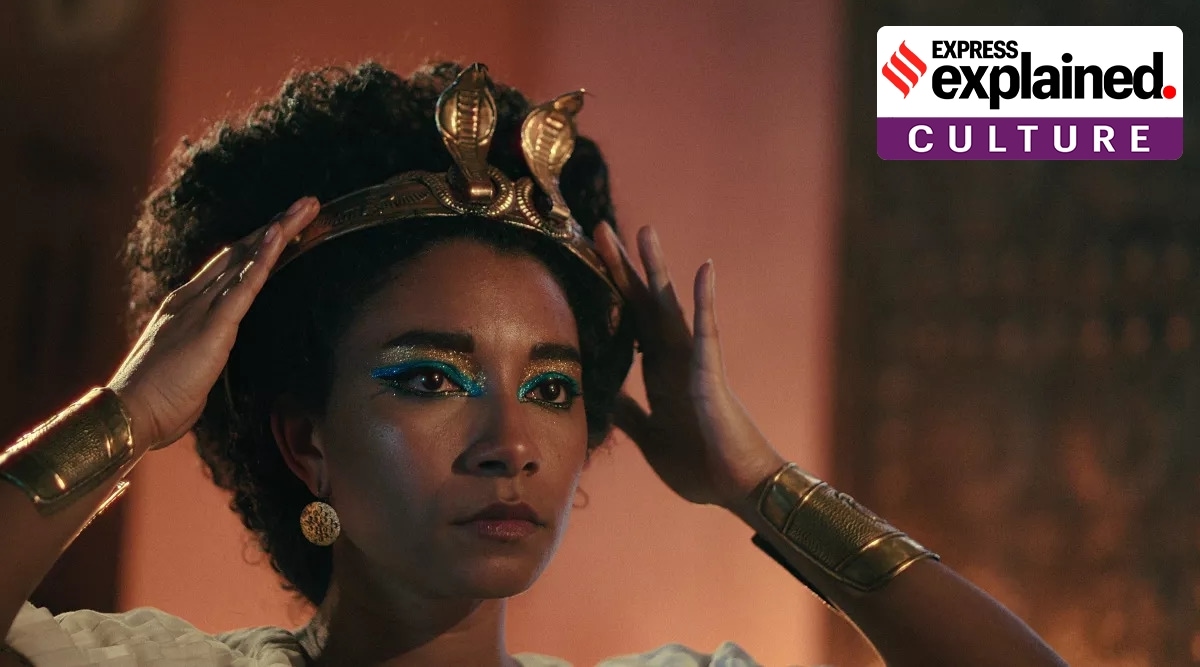Row over Netflix show: Was Queen Cleopatra Black?
Netflix docudrama series on the Egyptian queen’s life has landed in controversy because Cleopatra is portrayed by a Black woman in the film.
 The portrayal of Queen Cleopatra as a Black woman in Netflix's latest docudrama has caused controversy. (Photo: Netflix/ Screengrab)
The portrayal of Queen Cleopatra as a Black woman in Netflix's latest docudrama has caused controversy. (Photo: Netflix/ Screengrab) Netflix’s docudrama on the life of ancient Egypt’s most famous queen, Cleopatra, has stirred controversy due to its casting choices – primarily the portrayal of Cleopatra by a Black woman.
People from Egypt are particularly outraged, complaining about cultural appropriation and the rewriting of their history. Egypt’s Ministry of Tourism and Antiquities has even issued a long statement stressing that “Queen Cleopatra had light skin and Hellenistic (Greek) features,” and criticises Netflix for casting Adele James, who has “African features and dark skin” according to the Ministry.
The three-part docudrama, produced by Jada Pinkett Smith and starring biracial British actor Adele James as Queen Cleopatra, was released earlier today (May 10). Notably, this is not the first time that there has been controversy regarding Cleopatra’s skin colour.
Who was Queen Cleopatra?
Cleopatra VII was the last monarch of the Ptolemaic dynasty, a family of Macedonian-Greek origin which ruled Egypt from the death of Alexander the Great in 323 BC until the country’s conquest and occupation by Octavian (later Emperor Augustus) in 30 BC.
During her 21 year rule (51-30 BC), Cleopatra is remembered for having maintained Egypt’s autonomy through astute diplomacy and personal charisma amidst the ever growing Roman Empire. Her death, by suicide, thus marked the end of Egyptian civilisation as a vibrant living culture.
 Liz Taylor as Cleopatra in the eponymous classsic from 1963. (Wikimedia Commons)
Liz Taylor as Cleopatra in the eponymous classsic from 1963. (Wikimedia Commons)
Over the years, Cleopatra has fascinated historians and lay people alike. Her story has been told and retold in popular literature and films, with Cleopatra often depicted as a seductive temptress.
What have critics said about Netflix’s docudrama?
According to critics, since the film is specifically marketed as a documentary, it needs to be faithful to facts.
“Those making the film have to be accurate and it should be based on historical and scientific facts, to ensure that history and civilizations are not falsified,” the Egyptian Ministry said.
An Egyptian lawyer has filed a formal complaint against the film. “Our main objection is the falsification of these facts. It is not about being Black or White or even Yellow. Let’s say they wanted to portray Cleopatra as a man, we would also object to that,” Mahmoud El-Semiry, the lawyer who filed the complaint, told CBS News.
Critics have accused Netflix of “blackwashing” – forcefully inserting a Black character at the expense of accuracy, for “political” reasons.
But what was Cleopatra’s ethnicity?
While various scholars have suggested that Cleopatra was indeed Black, there is no actual evidence behind these claims.
According to Duana W Roller, author of Cleopatra: A Biography, Cleopatra was born in 69 BC in a dynasty that went back 250 years. Her ancestor, Ptolemy I, who founded the dynasty, was Macedonian-Greek and a close companion of Alexander the Great. Cleopatra was eight generations removed from Ptolemy.
The questions about Cleopatra’s ethnicity arise from lack of evidence about the women in her ancestral line. While there is a degree of certainty regarding the Macedonian-Greek origins of the first six generations of wives of the ruling Ptolemies, uncertainty surrounds the origins of Cleopatra’s mother and grandmother.
While Cleopatra’s grandfather had two Macedonian-Greek wives, he also had a concubine of possibly Egyptian origin. Same is the case with Cleopatra’s father. Contemporary historical sources do not shed light on the identities of Cleopatra’s mother and grandmother but, as per Roller, “while it is quite possible that Cleopatra was pure Macedonian Greek … it is probable that she had some Egyptian blood, although the amount is uncertain.”
What Roller insists is that Cleopatra definitely did not have any Black African ancestry. Historical portrayals of Cleopatra, from relief art to descriptions by Roman historians also point to Cleopatra having Hellenic features.
The politics of portrayal: Should Cleopatra’s actor’s ethnicity matter?
However, categories such as “Black” and “White” are relatively recent creations, a product of European colonialism. Thus, the very question “was Cleopatra Black (or White)?” is more to do with contemporary issues and anxieties surrounding race and identity, than about Cleopatra and her world.
For instance, for a long time, Afrocentrists have claimed that Egypt was the first Black nation from whom ancient Greeks stole their pioneering ideas. For such thinkers, Cleopatra was a Black queen.This strand of thought stands in direct opposition to traditional Eurocentric understanding of the world – and thus furthers a political agenda in a world still rife with racism.
However, even portrayals of Cleopatra as White (like in the eponymous classic Cleopatra (1963) by Liz Taylor), are still borne out of a certain kind of politics. Kenan Malik, known for his writing on the history of race, argues in The Guardian that “if the projection of Cleopatra as black is rooted in myth and wish fulfilment, that of her as “white” equally taps into racial fables.” Thus the casting of Adele James is as “authentic” as that of Liz Taylor.
With respect to criticism by Egyptians, about “falsifying facts”, there is politics there as well. The criticism arises from issues around forging a unique “national identity” as well as opposition to Afrocentrism as a “racist” movement.
“I am against the film because it is pushing an Afrocentric agenda …They are imposing the identity politics of the 21st century and appropriating the ancient Egyptian past, just as the Eurocentrists and the far-right in Europe are doing,” Egyptian archaeologist Dr Monica Hanna told CBS News.
What is crucial to remember is that whatever the skin tone of the actor may be, no modern day portrayal of Cleopatra will be free of political baggage of the present.
- 01
- 02
- 03
- 04
- 05






































